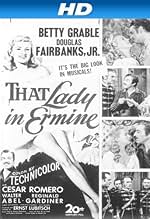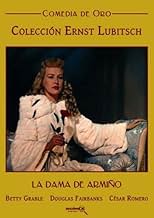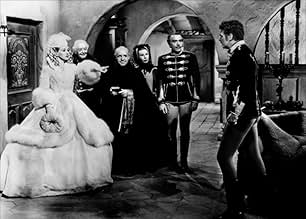CALIFICACIÓN DE IMDb
5.8/10
967
TU CALIFICACIÓN
Agrega una trama en tu idiomaThat Lady in Ermine tells two parallel stories, both taking place in the small Mittel-European duchy of Bergamo, with one set in the 19th century and the other in the 16th.That Lady in Ermine tells two parallel stories, both taking place in the small Mittel-European duchy of Bergamo, with one set in the 19th century and the other in the 16th.That Lady in Ermine tells two parallel stories, both taking place in the small Mittel-European duchy of Bergamo, with one set in the 19th century and the other in the 16th.
- Dirección
- Guionistas
- Elenco
- Nominado a 1 premio Óscar
- 2 nominaciones en total
Lester Allen
- Jester
- (sin créditos)
Mary Bear
- Isabella - Ancestor
- (sin créditos)
David Bond
- Gabor
- (sin créditos)
Harry Carter
- Staff Officer
- (sin créditos)
Harry Cording
- Orlando - Ancestor
- (sin créditos)
Herbert Evans
- Ancestor
- (sin créditos)
Jack George
- Count Giovanni - Ancestor
- (sin créditos)
Don Haggerty
- Staff Officer
- (sin créditos)
Joe Haworth
- Soldier
- (sin créditos)
Ray Hyke
- Albert's Knight
- (sin créditos)
- Dirección
- Guionistas
- Todo el elenco y el equipo
- Producción, taquilla y más en IMDbPro
Opiniones destacadas
If you have the opportunity to catch this one on TV (It's in American Movie Classic's library, I believe, and doesn't appear to be available on video.) and you're a fan of Ernst Lubitsch, don't expect much evidence of his famous "Touch." Herr Lubitsch died before completing very much of this production and the directing reigns were turned over to Otto Preminger. Apparently the studio felt that an artist whose ancestral origins shared to some degree those of Mr. Lubitsch was the proper person to complete this project. My own impression of the final results makes the passing of the talented Mr. Lubitsch a great misfortune for all concerned. As I watched it on a TV broadcast several years ago I stared in amazement at what seemed an extraordinarily clumsy and heavy-handed attempt to tell what is, essentially, a fairy story for adults. There are definitely elements to enjoy and Betty Grable is, as always, appealingly lovely in Technicolor and has a lively and natural presence as an actress. But Mr. Preminger's reputation, without later critically praised films, such as "Anatomy of a Murder," was not greatly enhanced by the final cut of this film.
I really enjoyed this Lubitsch movie with Betty Grable. It made quite a change from her usual "musicals", and I cannot again understand why there have been no videos or DVDs made of it. Younger viewers who don't even know who Betty Grable is will surely appreciate this Lubitsch movie. Here's hoping!
I enjoyed this film far more than anything had led me to anticipate; from reading other comments here, I suspect it benefits enormously from being seen on a full-size screen in the cinema, in the company of a cheerful and enthusiastic audience. I was lucky enough to have that experience, borne up on ripples of laughter from all around, and had an immensely good time with this undemanding comedy.
For it is as a comedy that it shines, if it shines anywhere at all. The music is nothing special -- in fact, I hadn't realised it *was* a musical, and was very surprised when the assembled ancestors burst into half-spoken lyric -- but I do have to admit that the half-threat, half-promise of 'Oh, what I'll do...' has proved far more catchy than it ever seemed at the time, as it's still going round and round in my head!
The plot, such as it is, largely pivots around the past history of the eponymous Francesca, a sixteenth-century portrait sporting a distinctly anachronistic hairstyle and fur-coat. Her idea on the sanctity of marriage don't quite jibe with those of her distant descendant, the Countess Angelina, and one can almost hear the storyline creaking at the seams under the strain of the Production Code in order to ensure that the heroine arrives unsullied in her much-delayed marriage-bed with the right man...
The romance is scarcely earth-shattering, and in fact the first few scenes, played pretty well straight, verge on the tedious. But where script and film really come to life is in the battle of the sexes that follows. The impudence of Douglas Fairbanks Jr's courtship of Betty Grable's married Angelina is equalled only by Betty-Grable-as-Francesca's pursuit of him in turn, culminating in complete role-reversal in the hilarious fantasy sequence where she -- literally -- sweeps him off his feet. This is probably the comic climax of the plot, although the consequences of the Colonel's understandable confusion are worked out with a deft touch in the remaining two 'acts' of the operetta-structure, and the spectacle of Fairbanks' blissful, bemused awakening is more or less worth the price of admission on its own.
Grable is entirely convincing in establishing her two contrasting characters, wisely gets almost all the (limited) singing opportunities, and shares the honours where the swathes of quotable dialogue in the various verbal duels are concerned. But in the field of unspoken reaction she is really outclassed by her male supporting leads; Fairbanks in particular is an absolute treat in a number of wordless sequences whose set-up and humour is worthy of the silent screen.
This film is too uneven in style to be a classic, varying from sparkling repartee to hackneyed tedium. But at its best it is quite honestly very funny indeed, and brought a round of spontaneous applause and laughter across the auditorium at the end as the lights went up. Out of tune with its times, it may have failed to draw contemporary audiences -- but, on this showing, really didn't deserve to be disowned by both Grable and Preminger, the (uncredited) director. This is no masterpiece, but a thoroughly entertaining minor work, and I for one found myself grinning in remembrance all the way home.
For it is as a comedy that it shines, if it shines anywhere at all. The music is nothing special -- in fact, I hadn't realised it *was* a musical, and was very surprised when the assembled ancestors burst into half-spoken lyric -- but I do have to admit that the half-threat, half-promise of 'Oh, what I'll do...' has proved far more catchy than it ever seemed at the time, as it's still going round and round in my head!
The plot, such as it is, largely pivots around the past history of the eponymous Francesca, a sixteenth-century portrait sporting a distinctly anachronistic hairstyle and fur-coat. Her idea on the sanctity of marriage don't quite jibe with those of her distant descendant, the Countess Angelina, and one can almost hear the storyline creaking at the seams under the strain of the Production Code in order to ensure that the heroine arrives unsullied in her much-delayed marriage-bed with the right man...
The romance is scarcely earth-shattering, and in fact the first few scenes, played pretty well straight, verge on the tedious. But where script and film really come to life is in the battle of the sexes that follows. The impudence of Douglas Fairbanks Jr's courtship of Betty Grable's married Angelina is equalled only by Betty-Grable-as-Francesca's pursuit of him in turn, culminating in complete role-reversal in the hilarious fantasy sequence where she -- literally -- sweeps him off his feet. This is probably the comic climax of the plot, although the consequences of the Colonel's understandable confusion are worked out with a deft touch in the remaining two 'acts' of the operetta-structure, and the spectacle of Fairbanks' blissful, bemused awakening is more or less worth the price of admission on its own.
Grable is entirely convincing in establishing her two contrasting characters, wisely gets almost all the (limited) singing opportunities, and shares the honours where the swathes of quotable dialogue in the various verbal duels are concerned. But in the field of unspoken reaction she is really outclassed by her male supporting leads; Fairbanks in particular is an absolute treat in a number of wordless sequences whose set-up and humour is worthy of the silent screen.
This film is too uneven in style to be a classic, varying from sparkling repartee to hackneyed tedium. But at its best it is quite honestly very funny indeed, and brought a round of spontaneous applause and laughter across the auditorium at the end as the lights went up. Out of tune with its times, it may have failed to draw contemporary audiences -- but, on this showing, really didn't deserve to be disowned by both Grable and Preminger, the (uncredited) director. This is no masterpiece, but a thoroughly entertaining minor work, and I for one found myself grinning in remembrance all the way home.
Watching That Lady In Ermine I was wondering what Betty Grable was doing in a project that seemed to be aimed for Marlene Dietrich to do. Someone over at 20th Century Fox may have decided one sex symbol is as good as another. Darryl F. Zanuck should have known better.
Betty plays a 19th century Italian countess whose domain has been invaded by a troop of Hungarian Hussars captained by Douglas Fairbanks, Jr. Her ghostly ancestor whose portrait hangs in the palace hall along with the rest of her distinguished family tree, sees no small resemblance in Doug now and another invader some 300 years earlier whom she dealt with when armies failed.
Besides that the current Betty has just been married to Cesar Romero and the invasion has come at a most inopportune moment, before things have been consummated. That's going to give anyone a bad attitude, I guarantee.
Fresh, wholesome all American Betty is NOT the actress to do seductive and mysterious. Marlene Dietrich might have put this over, but with Betty it falls flatter than yesterday's presidential candidate. She and Fairbanks have no chemistry at all, though Doug is as charming as ever and someone I can watch in anything.
Frederick Hollander and Leo Robin wrote the score for this film and This Is The Moment got an Oscar nomination for Best Song. That Lady In Ermine's one chance for Oscar glory fell to Buttons And Bows.
Ernest Lubitsch died midway during the film and Otto Preminger finished That Lady In Ermine. I can't believe Lubitsch had Grable in mind for the lead here. Neither will you if you see That Lady In Ermine.
Betty plays a 19th century Italian countess whose domain has been invaded by a troop of Hungarian Hussars captained by Douglas Fairbanks, Jr. Her ghostly ancestor whose portrait hangs in the palace hall along with the rest of her distinguished family tree, sees no small resemblance in Doug now and another invader some 300 years earlier whom she dealt with when armies failed.
Besides that the current Betty has just been married to Cesar Romero and the invasion has come at a most inopportune moment, before things have been consummated. That's going to give anyone a bad attitude, I guarantee.
Fresh, wholesome all American Betty is NOT the actress to do seductive and mysterious. Marlene Dietrich might have put this over, but with Betty it falls flatter than yesterday's presidential candidate. She and Fairbanks have no chemistry at all, though Doug is as charming as ever and someone I can watch in anything.
Frederick Hollander and Leo Robin wrote the score for this film and This Is The Moment got an Oscar nomination for Best Song. That Lady In Ermine's one chance for Oscar glory fell to Buttons And Bows.
Ernest Lubitsch died midway during the film and Otto Preminger finished That Lady In Ermine. I can't believe Lubitsch had Grable in mind for the lead here. Neither will you if you see That Lady In Ermine.
Betty Grable is "That Lady in Ermine" in this 1948 musical, also starring Douglas Fairbanks, Jr., Cesar Romero, Reginald Gardner, and Walter Abel.
Frankly, it's hard for me to believe that Lubitsch directed this. And in fact, he died eight days into production and the film was finished by Otto Preminger. The story is taken from a 1922 musical, and originally Lubitsch wanted Jeanette MacDonald for the role; Zanuck wanted Gene Tierney; finally Irene Dunne and Charles Boyer were announced, but it didn't happen.
Grable has a dual role here, as Angelina in 1861 and her ancestor Francesca, from 1561, whose portrait hangs in the great hall. Angelina has just been married to Count Mario, who, as soon as they get into her quarters, is called to action against Hungarian invaders. The Hungarians also invaded 300 years ago, and Francesca was able to save the castle. Can her ancestor do it again, in spite of feeling attracted to the handsome colonel (Douglas Fairbanks Jr.)? The film takes us into the past and back into the present, and it's a lush, gorgeous production. Grable's gowns are exquisite, and she looks gorgeous. Someone here noted she was past her prime (at the ripe old age of 31) and a little plump. She sure didn't look it to me, she looks fantastic. The color in the film is eye-popping as well.
There is really no music to speak of, except for a couple of songs that are continually repeated. There are some funny bits, and it's a fine cast. The ancestors step out of their portraits and come to life, and at one point, Fairbanks is dubbed and sings gloriously in an operatic tenor voice. Fairbanks is wonderful; Grable is perhaps a little too vanilla for the role, but she gives the role a youthful energy. Other than Tierney, the other stars, who were legit sopranos, were a bit older. The story, what there was of it, really needed the lightness Grable gave it.
See it for incredible color and costumes and a fine cast. The music and the story aren't of much consequence - it's nice postwar fluff.
Frankly, it's hard for me to believe that Lubitsch directed this. And in fact, he died eight days into production and the film was finished by Otto Preminger. The story is taken from a 1922 musical, and originally Lubitsch wanted Jeanette MacDonald for the role; Zanuck wanted Gene Tierney; finally Irene Dunne and Charles Boyer were announced, but it didn't happen.
Grable has a dual role here, as Angelina in 1861 and her ancestor Francesca, from 1561, whose portrait hangs in the great hall. Angelina has just been married to Count Mario, who, as soon as they get into her quarters, is called to action against Hungarian invaders. The Hungarians also invaded 300 years ago, and Francesca was able to save the castle. Can her ancestor do it again, in spite of feeling attracted to the handsome colonel (Douglas Fairbanks Jr.)? The film takes us into the past and back into the present, and it's a lush, gorgeous production. Grable's gowns are exquisite, and she looks gorgeous. Someone here noted she was past her prime (at the ripe old age of 31) and a little plump. She sure didn't look it to me, she looks fantastic. The color in the film is eye-popping as well.
There is really no music to speak of, except for a couple of songs that are continually repeated. There are some funny bits, and it's a fine cast. The ancestors step out of their portraits and come to life, and at one point, Fairbanks is dubbed and sings gloriously in an operatic tenor voice. Fairbanks is wonderful; Grable is perhaps a little too vanilla for the role, but she gives the role a youthful energy. Other than Tierney, the other stars, who were legit sopranos, were a bit older. The story, what there was of it, really needed the lightness Grable gave it.
See it for incredible color and costumes and a fine cast. The music and the story aren't of much consequence - it's nice postwar fluff.
¿Sabías que…?
- TriviaIn later years Betty Grable said it was her least favorite of all her movies.
- ErroresIf you watch when the Lady in Ermine is dancing with Colonel Ladislas Karolyi Teglas / The Duke her shoes change from the heels to wedges.
- Citas
Col. Ladislas Karolyi Teglas: If one is in love, one doesn't need an umbrella.
- ConexionesFeatured in The Costume Designer (1950)
- Bandas sonorasOoh! What I'll Do (To That Wild Hungarian)
(uncredited)
Written by Friedrich Hollaender
Lyrics Leo Robin
Sung by Betty Grable and chorus
Danced by Betty Grable and Douglas Fairbanks Jr.
Selecciones populares
Inicia sesión para calificar y agrega a la lista de videos para obtener recomendaciones personalizadas
- How long is That Lady in Ermine?Con tecnología de Alexa
Detalles
Taquilla
- Presupuesto
- USD 2,484,000 (estimado)
- Tiempo de ejecución1 hora 29 minutos
- Color
- Relación de aspecto
- 1.37 : 1
Contribuir a esta página
Sugiere una edición o agrega el contenido que falta

Principales brechas de datos
By what name was La condesa se rinde (1948) officially released in India in English?
Responda
































